
1. LENIN.
Comrades, I am told that you have arranged a Lenin memorial meeting here this evening and that I have been invited as one of the speakers. I do not think there is any need for me to deliver a set speech on Lenin's activities. It would be better, I think, to confine myself to a few facts that bring out certain traits of Lenin as a man and as a leader. There may perhaps be no inherent connection between facts but that's not vitally important for getting a general idea of Lenin. At any rate I am unable on this occasion to do more than what I have just promised.
[...]
I first met Lenin in December 1905 at the Bolshevik conference in Tammerfors (Finland).
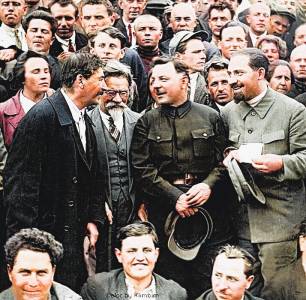
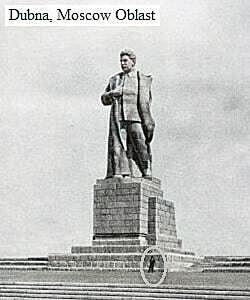
I was hoping to see the mountain eagle of our Party, the great man, great not only politically but, if you will, physically, because in my imagination I had pictured Lenin as a giant, stately and imposing. What, then, was my disappointment to see a most ordinary-looking man below average height, in no way—literally—distinguishable from ordinary mortals...
It's an accepted norm that a "great man" should arrive late to meetings to make the assembly wait with bated breath until the warning is whispered around the hall ahead of the "great man" entering, "Hush!... Silence!... He's coming." This norm did not seem superfluous to me; it mesmerizes and inspires respect.
What, then, was my disappointment to learn that Lenin had arrived at the conference ahead of the delegates, settled himself in a corner and was unassumingly holding a most ordinary conversation with the most ordinary delegates. I will not hide from you that this seemed to me at the time to be a near-violation of certain basic rules.
Only later did I comprehend that this simplicity, modesty and wish to shun notoriety—or at least to make himself inconspicuous and veil his lofty rank—was one of Lenin's greatest assets as the new leader of the simple ordinary masses, the "rank and file" of humanity.1
[...]
Lenin was born for revolution. He was truly the genius of revolutions and the supreme master of revolutionary leadership. He never felt so free and happy as during a period of revolutionary turmoil.
I do not intend to say by this that Lenin condoned all revolutionary uprisings equally or always welcomed them under any circumstance. Not at all. What I do mean to say is that Lenin's genial insight was never as fully visible or as plain as during a time of revolution.
In times of revolution he literally blossomed, he became a seer, divined the reaction of classes and the probable zigzags of the revolution, seeing them, as it were, drawn on the palm of his hand. Our Party circles used to say with good reason, "Lenin swims in the tide of revolution like a fish in the water."
[...]
2. THIRTEENTH CONGRESS OF THE RUSSIAN COMMUNIST PARTY.1
[...]
[...]
6. Two conclusions regarding internal Party life:
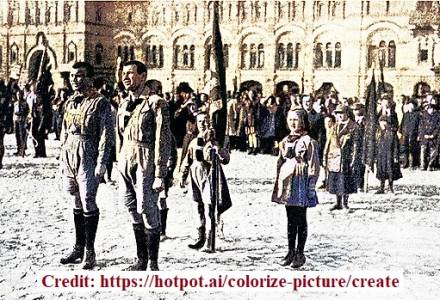
a) The so-called "principle" of broadening the Party Central Committee has proven correct. Experience has shown the immense value of broadening the Central Committee and it has also shown that the comrades who upheld the "principle" of narrowing it down were taking a wrong turn.
b) It is now clear to all that the opposition was entirely wrong in asserting during the discussion that the Party was in a state of disintegration. You are not likely to find a single organization of any importance in our Party which, upon observing the development of inner-Party life and the Party's powerful growth, would not say that those who yesterday were croaking that our Party was heading for ruin did not, in fact, know the Party, were far removed from it and were very reminiscent of people who ought to be rightly described as outsiders.
To sum up: our Party is growing, forging ahead, learning efficient administration and becoming the most influential organ of the working class.
The Lenin Enrolment is a direct indication of this.2
(Prolonged applause)
[...]
Comrades, I found no objections to the Central Committee's organizational report in any of the speeches made at the congress. I take this to mean that the congress agrees with the conclusions of that report.3
(Applause)
I deliberately refrained in my report from discussing our internal disagreements. I did not touch on them because I did not wish to re-open wounds that had healed, or so it seemed. But since Trotsky and Preobrazhensky brought them up, made a number of inaccurate statements and threw down the gauntlet, it would not be right for me to remain silent. Silence in this circumstance would not be understood.
Comrade Krupskaya has objected here to the repetition of the debate on our disagreements. I am absolutely opposed to such repetition and that's precisely why I did not mention them in my report. But since the comrades of the opposition have brought up the subject and have thrown down a challenge, we have no right to be silent.
In regard to our disagreements both Trotsky and Preobrazhensky try to focus the attention of the congress on the resolution of December 5, 1923. They forget that there is another resolution as well on the results of the intra-Party discussion.4
They forget that there was a Thirteenth Party Conference [January 16-18, 1924] and that the Central Committee's resolution of December 5, 1923, was followed by a new wave of discussion whose results were appraised in a special resolution at that conference. They forget that hushing all this up cannot but discredit the opposition.
I draw the attention of the congress to the fact that said conference approved two resolutions on Party affairs. Why? One was the resolution previously endorsed by the entire Party and adopted by the Central Committee on December 5, 1923, and the other was the resolution on the petty-bourgeois deviation.
Why this affliction? What is the explanation? The explanation is that the intra-Party discussion covered two periods. The first period concluded with the unanimously adopted resolution of December 5, 1923, and the second period concluded with the resolution on the petty-bourgeois deviation.
We believed that the December 5 resolution would end the controversy and that was why in my report to the Thirteenth Conference, when tackling this issue, I said that had the opposition so wished it the December 5 resolution could have ended the discord in the Party. That was what I said and what we all believed. But the point is that the discussion was not brought to a close. After the December 5 resolution Trotsky's letters appeared. These constituted a new platform raising new issues that triggered a fresh wave of discussion, more heated than the first one. This destroyed the possibility of restoring peace inside the Party and ushered the second period which the oppositionists now try to hush up and pass over.
[...]
Now Trotsky and Preobrazhensky try to hush up and hide their second platform in the belief, evidently, that they can outwit the Party. No, you won't succeed! You cannot deceive the congress with your none-too-clever stratagems and diplomacy. I don't doubt that the congress will express its opinion on both the first stage of the discussion, summed up in the December 5 resolution, and on the second stage summed up in the resolution of the Conference on the petty-bourgeois deviation.5
[...]
Let us examine who has proven right on the issues raised in the opposition platform after December 5. Who has proven right on the four new issues raised in Trotsky's letters?
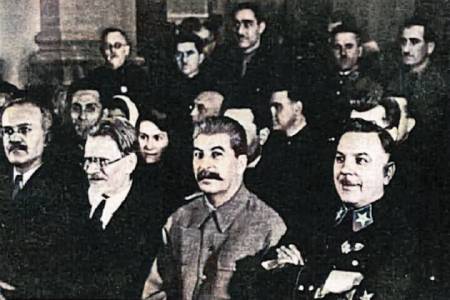
First issue: degeneration of the cadres. We have all demanded and continue to demand that facts be adduced to prove that the cadres are degenerating. But no facts have been produced, nor could they be, because no such facts exist. And when we looked into the matter properly we all discovered that there was no degeneration but a petty-bourgeois deviation on the part of certain opposition leaders. Who then was correct? Not the opposition, it would seem.
Second issue: the student youth, supposedly the Party's truest barometer. Who has proven right on this point? Again, it would seem not the opposition. If we look at the growth of our Party in this period, at the admission of two hundred thousand new members, it follows that the barometer must be sought not among the student youth but in the ranks of the proletariat, and that the Party must gravitate toward its proletarian core, not toward the student youth. The barometer is the two hundred thousand new members. Here too the opposition has been proven wrong.
Third issue: punitive measures against the Party apparatus. Who has proven right? Again, not the opposition. It furled its flag of attack on the apparatus and passed to the defensive. All of you here have seen how it tried to wriggle out, how it beat a disorderly retreat in the fight against the Party apparatus.
Fourth issue: factions and groups. Trotsky has announced that he is resolutely opposed to groups. That's all well and good. But if we must go into the history of the issue allow me to re-establish certain facts.
In December a sub-commission of the Central Committee framed the resolution published on December 5, 1923. This sub-commission consisted of three members: Trotsky, Kamenev, Stalin.
Have you noticed that there is no mention of groups in the December 5 resolution? It deals with the prohibition of factions but says nothing about prohibiting groups. There's only a reference to the well-known Tenth Congress [March 8-16, 1921] resolution on Party unity.
How is this to be explained? Was it an accident? No, it was not. Kamenev and I firmly insisted on the prohibition of groups. Trotsky protested against their prohibition and his protest was tantamount to an ultimatum, for he declared that in that case he could not vote for the resolution. And so we confined ourselves to a reference to the Tenth Congress resolution which Trotsky, apparently, had not read and which provides not only for the prohibition of factions but for the prohibition of groups as well.
(Laughter, applause) 6
At that time Trotsky was in favour of freedom of groups. At this congress he has praised the December 5 resolution. But in his letter to the Central Committee of December 9, that is four days after the adoption of the resolution on Party affairs, Trotsky wrote: "I am especially alarmed by the purely formal attitude of Politburo members on the question of groups and factional formations." What do you think about that? Here is a man who extols the resolution but who, it turns out, is especially alarmed in his soul by the Politburo's attitude on the issue of groups and factions. This does not seem to indicate that he was then in favour of prohibiting groups. No, Trotsky favoured the formation and freedom of groups at that time.
Further, who does not remember the resolution Preobrazhensky submitted in Moscow, demanding that the issue of factions, decided by the Tenth Party Congress, be given a more precise formulation entailing the removal of some restrictions? Everyone in Moscow remembers it. And is there any among you who does not remember the newspaper articles where Preobrazhensky demanded that we revive the order of things which existed in the Party at the time of the Brest Peace? Yet we know that at that time the Party was forced to tolerate the existence of factions.
And who does not remember that when I proposed at the Thirteenth Conference to remind the Party about Point Seven of the Tenth Party Congress resolution on Party unity—the prohibition of groups—who does not remember how all the oppositionists raged, insisting that this point should not be introduced? Consequently the opposition's attitude has been in favour of full freedom for groups throughout.
The opposition thought that it could lull the vigilance of the Party by declaring that it was demanding freedom for groups, not factions. If we are told that the opposition today is against groups, that's all well and good; but this cannot certainly be called an offensive on their part. It's rather a disorderly retreat, an admission that the Central Committee was right all along.
After this review of the facts, permit me, comrades, to say a few words on certain fundamental mistakes that Trotsky and Preobrazhensky made in their utterances on questions of Party organization.
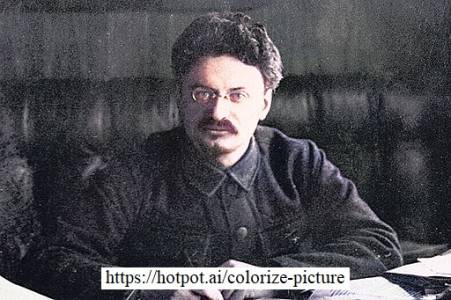
Trotsky has said that the essence of democracy can be reduced to a question of generations. That's wrong, wrong in principle. The essence of democracy can by no means be reduced to that. The question of generations is a secondary one. The life of our Party and of its figures shows that the younger generation is climbing step by step to cadre status. That has always been so and will continue to be the Party's line. Only those who regard our cadres as a privileged caste that does not admit new members or as an officer corps of the old regime that looks down on outsiders—only those who wish to drive a wedge between the cadres and the younger Party members—can make a question of generations in the Party the litmus test of democracy in the Party. The essence of internal democracy is not a question of generations but of letting the Party members take an active role in leadership. In this way alone can the question of internal democracy be framed if, of course, we are discussing not a party with a formal democracy but a genuinely proletarian party with indissoluble bonds to the mass of the working class.
The second question. Trotsky maintains that the greatest danger is the bureaucratization of the Party apparatus. This too is wrong. The danger resides not in this but in the possibility of the Party actually isolating itself from the non-Party masses. You can have a party with a democratically constructed apparatus, but if the Party is not linked with the working class this democracy will be worthless, not worth a brass farthing. The Party exists for the class. So long as it's linked with the class, maintains contact with it, enjoys prestige and respect among non-Party masses, can it exist and progress, even with bureaucratic shortcomings. But in the absence of all this the Party is doomed no matter whether the Party organization is bureaucratic or democratic. The Party is part of the class; it exists for the class, not for itself.
Trotsky's third contention is also erroneous in principle: the Party makes no mistakes. That's wrong. The Party not infrequently makes mistakes. Ilyich taught us to teach the Party how to exercise correct leadership by learning from its mistakes. If the Party made no mistakes there would be nothing to teach it. It's our task to detect these mistakes, lay bare their roots and show the Party and the working class why we made them and how to avoid repeating them in future. The maturity of the Party and the maturing of Party leaders and cadres would be impossible without learning this, for they mature striving to redress their mistakes. It seems to me that this statement of Trotsky's is a kind of compliment coupled with an unsuccesful attempt to jeer at the Party.
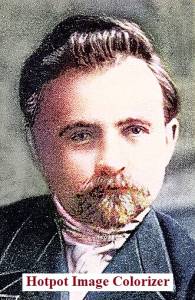
Next, Preobrazhensky. He spoke about the purge. Preobrazhensky feels that the purge is a weapon used by the Party majority against the opposition. Evidently he does not approve of the methods employed in the purge.
This is a question of principle. Preobrazhensky's profound mistake is his failure to understand that the Party cannot strengthen its ranks without periodical purges of the unstable elements. Comrade Lenin taught us that the Party can stay fit only if it rids itself periodically of unstable elements that infiltrate and will continue to infiltrate its ranks. We would be going against Leninism if we were to repudiate Party purges in general.
As for the present purge, what is wrong with it? It's said that individual mistakes have been made. Certainly they have. But has there ever been a big undertaking devoid of individual mistakes? Never. Individual mistakes may and will occur, but in the main the purge is correct.
I was told with what fear and trepidation some non-proletarian elements—intellectuals and office employees—underwent the purge.
This is a scene that was described to me: a group of people sit in an office, waiting to be called before the purging commission. It's a Party unit in a Soviet institution. In another room sits the purging commission.
A member of the Party unit comes rushing out of the commission room, perspiring. He is asked what happened, but all he can say is: "Let me catch my breath, let me catch my breath. I'm all in." 7
(Laughter)
The purge may be bad for the kind of people who suffer and perspire like that, but it's a very good thing for the Party.
(Applause)
Unfortunately we still have a certain number of Party members earning a thousand or two thousand rubles per month who forget that the Party exists. I know of a Party unit at one of the Commissariats in which this type of men works. The members of this unit include several chauffeurs and the unit selected one of them to sit on the purging commission. This triggered no small amount of grumbling that a chauffeur should be allowed to purge Soviet big-wigs. There were cases like that here in Moscow. Party members who have evidently lost contact with the Party are indignant, they cannot stomach the fact that "some chauffeur" will put them through the wringer of a purge. Such Party members must be educated and re-educated, sometimes by expulsion from the Party.
The chief thing about a purge is that it makes people of this kind feel that there is a master above them—the Party—which can call them to task for all the sins committed against it. It seems to me absolutely necessary that this master ought to go through the Party ranks armed with a broom every now and then.
(Applause)
Preobrazhensky says: Your policy is correct but your organizational line is wrong, and therein lies the possible ruin of the Party. That's nonsense, comrades. That a party with a correct policy should perish because of organizational shortcomings is something that does not happen. It never works out that way. The foundation of Party life and Party work resides not in the organizational line it adopts or may adopt at any given moment but on its policy, its home and foreign policy. If the Party's policy is correct, if it has a correct approach to the political and economic issues that are of decisive significance to the working class, then organizational defects cannot be of decisive significance; its policy will pull it through. That has always been the case and will continue to be so in the future. People who fail to understand this are bad Marxists, they forget the very rudiments of Marxism.
Was the Party right on the discussion issues, the economic questions and the questions of Party affairs? Anyone who wishes to obtain an immediate concise answer should turn to the Party and the mass of workers and put the question this way: how does the mass of non-Party workers regard the Party? Is it sympathetic or unsympathetic? If the members of the opposition were to put the question that way, if they were to ask themselves, is the working class sympathetic or unsympathetic to the Party? they would realize that the Party is on the right track. The Lenin Enrolment is the key to understanding the outcome of the discussion.8
If the working class sends two hundred thousand members into the Party, selecting the most upright and staunch, it means that the Party is invincible because it has in fact become the favourite organ of the working class, one that enjoys its undivided confidence. Such a party will live and strike fear into its enemies; such a party cannot disintegrate.
The trouble with our opposition is that it did not approach Party problems and the outcome of the discussion from the standpoint of a Marxist who appraises the weight of the Party in the light of its influence among the masses, for the Party exists for the masses, not vice versa. The opposition approached the issues from the formal standpoint of a "pure" apparatus.
To find a simple and direct clue to understanding the outcome of the discussion one must not babble about the apparatus but turn to the two hundred thousand who joined the Party and demonstrated its profound democracy. References to democracy by the oppositionists are just empty talk. But when the working class sends two hundred thousand new members into the Party, that's real democracy.
Our Party has become the preferred organ of the working class. Point out another party like it to me. You cannot point one out because none exists so far. But the oppositionists, strange as it may seem, do not like such a powerful party. Where on this earth will they find a better one? I'm afraid they will have to travel to Mars in their search for a better party.
(Applause)
The last question: the opposition's petty-bourgeois deviation. Their assertion that the accusation is unjust. Is that true? No, it is not. How did the charge arise, what is its foundation? It is founded on the fact that the oppositionists in their unbridled agitation for democracy in the Party have unwittingly, unintentionally, served as a sort of mouthpiece for that new bourgeoisie 9 that does not care a hang about democracy in our Party but who would like, very much so, to have formal democracy everywhere in the country.
The section of the Party that raised such a hullabaloo over questions of democracy has unwittingly served as a mouthpiece and vehicle for the agitation of the new bourgeoisiein the country which aims at weakening the dictatorship of the proletariat, at "broadening" the Soviet Constitution and reinstituting political rights for the exploiters. That's the mainspring and secret why members of the opposition who undoubtedly love the Party, and so on and so forth, have unawares become a mouthpiece for the external elements that seek to weaken and dissolve the dictatorship.
No wonder the sympathies of the Mensheviks and Socialist-Revolutionaries are with the opposition. Is that accidental? No, it's not. The alignment of forces internationally is such that every attempt to weaken the authority of our Party and the stability of the dictatorship in our country will inevitably be seized upon by the enemies of the revolution as a definite asset irrespective of who makes the attempt, our opposition, the Socialist-Revolutionaries or the Mensheviks. Whoever fails to understand this, fails to grasp the consequences of factional divisions in our Party, fails to realize that the ultimate outcome of the struggle rests on the net sum of pro-Soviet and anti-Soviet elements. That's the basis for accusing the opposition of a petty-bourgeois deviation.
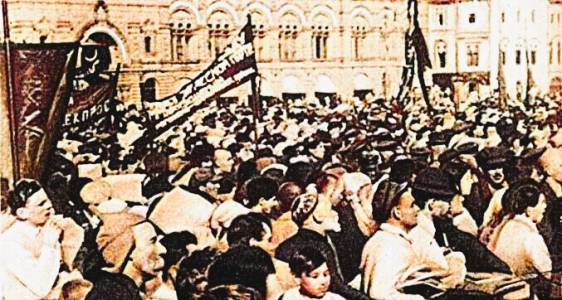
Lenin once said this about Party discipline and unity in our ranks, "Whoever weakens in the least the iron discipline of the Party of the proletariat (especially during its dictatorship phase) actually aids the bourgeoisie against the proletariat" (see Vol. XXV, p. 190).
Is there any need after all this to show that the comrades of the opposition have been weakening Party discipline with their attacks on the Moscow organization and on the Party's Central Committee, weakening and undermining the foundations of the dictatorship? For the Party is the cornerstone of the dictatorship.
That is why I think that the Thirteenth Conference was correct in declaring that we are dealing here with a deviation toward petty-bourgeois policy.
It's not yet a petty-bourgeois policy by any means! At the Tenth Congress Lenin explained that a deviation is something in the making, something that has not yet assumed a definite shape. And if you, comrades of the opposition, do not insist on this petty-bourgeois deviation, on these small mistakes, everything will be rectified and the Party's activities will go forward. But if you insist on it, the petty-bourgeois deviation may blossom into a petty-bourgeois policy. Consequently it all depends on you, comrades of the opposition.
What are the conclusions?
The conclusions are that we must continue to conduct internal Party work on the basis of complete unity. Look at this congress, at its solid support of the Central Committee line. There you have Party unity. The opposition represents an insignificant minority. That our Party is united, that it will continue to be united, is demonstrated by the present congress, by its unanimity and solidity. Whether we will have unity with that insignificant group in the Party known as the opposition depends on them. We want to work in harmony with the opposition. Last year, at the height of the discussion, we said that joint work with the opposition was necessary. We re-affirm this here today. But I do not know whether this unity will materialize, for unity will depend wholly on the opposition in future. In the present instance unity comes as the result of the interaction of two factors, the Party majority and minority. The majority wants joint activity. Whether the minority sincerely wants it, I do not know. That depends entirely on the comrades of the opposition.
Conclusion. The conclusion is that we must reaffirm the Thirteenth Conference resolutions and approve the work of the Central Committee. I don't doubt that the congress will endorse these resolutions and approve the political and organizational work of the Central Committee.10
(Prolonged applause)
Math problem: According to Stalin's own figures the number of Party members before the Lenin Enrolment was 472,000. The Lenin Enrolment brought in 200,000 new Party members as of May 1, 1924, but might end up bringing 250,000. What is the percentage of political illiterates in the Lenin Enrolment of 200,000? Of 250,000? And assuming the final numbers furnished by footnote 1?Political illiteracy in our Party is as high as 60% prior to the Lenin Enrolment, and I am afraid that with the Lenin Enrolment it will be brought up to 80%.
(The results of the Thirteenth Congress of the Russian Communist Party. Vol. 6, p. 268)
3. THE RESULTS OF THE THIRTEENTH CONGRESS OF THE RUSSIAN COMMUNIST PARTY.
[...]
There are four questions here: the opposition, the Lenin Enrolment, democratization of the Party leadership,1 theory in general and the propaganda of Leninism in particular.
a) The opposition. Now that the question of the opposition has been resolved by the congress and consequently the whole matter settled, one might ask: What is the opposition and what essentially was the issue involved in the intra-Party discussion?
I think, comrades, that the issue was one of life or death for the Party. Perhaps the opposition itself did not realize this, but that's not the point. The important thing is not what aims particular comrades or opposition groups set themselves. The important thing is the objective results sure to follow from the actions of such a group.
What does declaring war on the Party apparatus mean? It means working to destroy the Party.
What does inciting the youth against the cadres mean? It means working to disintegrate the Party.
What does fighting for freedom of groups mean? It means attempting to disrupt Party unity.
What does the effort to discredit Party cadres by talk about their degeneration mean? It means trying to cripple the Party, snap its backbone.
Yes, comrades, the issue was one of life or death for the Party. And that indeed explains the passion inflamed by the discussion. It also explains the fact—unparalleled in our Party's history—that the congress unanimously condemned the opposition's platform. The gravity of the danger welded the Party into a solid ring of iron.
[...]
What should our policy be with regard to these oppositionists or, more precisely, with regard to these former oppositionists? It should be an exceptionally comradely one. Every measure must be taken to help them come over to the central core of the Party to work jointly and in harmony.
[...]
4. THE PARTY'S IMMEDIATE TASKS IN THE COUNTRYSIDE.
[...]
A vivid illustration of such a turn of affairs is the recent revolt in Georgia.1
Our newspapers write that the events in Georgia were stage-managed.2 That's true, the revolt in Georgia was mainly artificial rather than popular. Nevertheless the Mensheviks drew a segment of the peasantry into the revolt in some places thanks to a weak link between the Communist Party and the masses, typically localities most saturated with Communist strength. There are relatively far more Communists in those localities than elsewhere. And yet it was there that our people missed, overlooked, failed to notice unrest among the peasants, notice that something was brewing, that discontent was growing day by day—and the Party knew nothing about it.
The Communists in places where they flourished proved to be the most divorced from the sentiments, thoughts and aspirations of the non-Party peasantry. That's the crux of the problem.
[...]
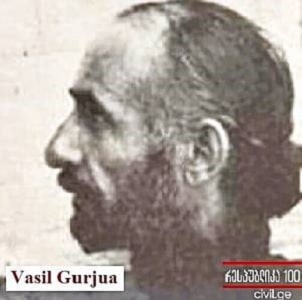
5. TROTSKYISM OR LENINISM?
[...]
We have dealt above with the legends directed against the Party and those about Lenin spread by Trotsky and his supporters in connection with October and the preparation for it. We have exposed and refuted these legends. But the question arises: For what purpose did Trotsky need all these legends about October and the preparation for October, about Lenin and the Party of Lenin? What is the purpose of Trotsky's new literary pronouncements against the Party? What is the sense, the purpose, the aim of these pronouncements presently when the Party does not want a discussion, when the Party is busy with a host of urgent tasks, when the Party needs joint efforts to restore our economy, not another struggle around old questions? For what purpose does Trotsky need to drag the Party back to new discussions? 1
[...]
What is the lesson to be learned from this? Only one: that prolonged collaboration between the Leninists and Trotsky is possible only if the latter completely forsakes his old stock-in-trade, only if he completely accepts Leninism.
Trotsky writes about the lessons of October but he forgets that there is one more lesson of October in addition to all the others, the one I have just mentioned, which is of prime importance for Trotskyism. Trotskyism ought to learn that lesson of October too.2
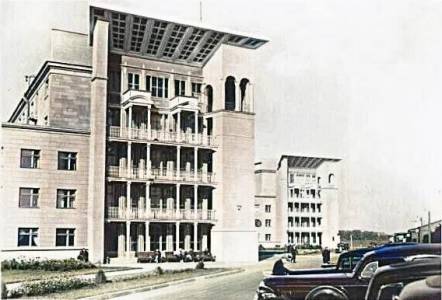
It's evident however that Trotskyism has not learned that lesson. The fact of the matter is that the old stock-in-trade of Trotskyism that was hidden in the cupboard during the period of the October movement is now being dragged out into the light again, in the hope that a market will be found for it since the market is currently expanding in our country.3
Undoubtedly Trotsky's new literary pronouncements are an attempt to revert to Trotskyism, to "surpass" Leninism, to drag in and implant all the specific features of Trotskyism.
The new Trotskyism is not a mere repetition of the old; its feathers have been plucked and is rather bedraggled. It's incomparably milder in spirit and more moderate in tone than the old Trotskyism, but undoubtedly retains all its specific features.
The new Trotskyism does not dare to come out openly against Leninism. It prefers to operate under the common flag but with the slogan of interpreting, improving Leninism. That's because the new Trotskyism is feeble. One can not regard the coincidence of its birth with Lenin's departure as accidental. Trotsky would not have dared to take such a risky step during Lenin's lifetime.
What are the characteristic features of the new Trotskyism?
1) On the question of "permanent" revolution. The new Trotskyism does not uphold the theory of "permanent" revolution brazenly. It "simply" asserts that the October Revolution confirmed the theory of "permanent" revolution fully, and from this draws the conclusion that the important and relevant portion of Leninism is what came after the war—after the October Revolution—whereas the portion before the war, before the October Revolution, is no longer valid.
Hence Trotskyites fracture Leninism in two epochs: pre-war Leninism, "old" and "useless" presently, with its idea of a joint dictatorship of the proletariat and the peasantry, and a novel post-war, post-October, Leninism which Trotskyites count on adapting to Trotskyism.
Trotskyism needs this fracture as a first step (more or less acceptable) before taking others in the fight against Leninism.
[...]
2) On the question of the Party principle. Old Trotskyism tried to undermine the Bolshevik Party principle with its theory (and practice) of unity with the Mensheviks. But that theory has suffered so much disgrace that nobody now even wants to mention it. To undermine the Party principle present-day Trotskyism has invented a new less odious and almost "democratic" theory of contrasting the old cadres with the recent ones.
According to Trotskyism our Party does not own a single integral history. Trotskyism divides it into two epochs of unequal importance: pre- and post-October. The pre-October epoch is, properly speaking, not history but "pre-history"; it is unimportant or at any rate not a very useful learning manual for our Party. The post-October epoch is relevant worthwhile history. The first epoch revolves around the "old" "pre-historic" irrelevant cadres of our Party. The second half dwells on the new relevant "history-making" Party.
It scarcely needs proving that this singular summary of Party history seeks to cut the bond between the old and new cadres, it's a stratagem to erase the Bolshevik Party principle. Needless to say, the Party cannot reconcile itself to such a grotesque formula.
3) On the question of the leaders of Bolshevism. Old Trotskyism tried to discredit Lenin more or less frankly, unafraid of the consequences. The new Trotskyism is more cautious and tries to achieve the same goal pretending to praise Lenin all the while. I think it worthwhile to quote a few examples.
The Party knows that Lenin was a relentless revolutionary. It also knows that he was cautious, he disliked reckless people and often with a firm hand restrained those who were infatuated with terrorism, including Trotsky himself.4
Trotsky touches on this subject in his book, "On Lenin," but his portrayal of Lenin may lead one to think that all Lenin did was "at every opportunity din into people's minds the idea that terrorism was inevitable." The impression is given that Lenin was the most bloodthirsty of all the bloodthirsty Bolsheviks.5
[...]
The Party knows that Lenin was the greatest Marxist of our times, a profound theoretician and a most experienced revolutionary to whom any trace of Blanquism was alien.
Trotsky's book also touches upon this aspect. But his portrait is not that of giant Lenin but of a dwarf-like Blanquist who in the October days advises the Party "to take power by its own hand independently of and behind the back of the Soviet." I have already said, however, that there is not a scrap of truth in this description.
[...]
You will ask: what is to be done now? What are the Party's immediate tasks in connection with Trotsky's new literary pronouncements?
Trotskyism is now taking action to discredit Bolshevism and undermine its foundations. It is the duty of the Party to bury Trotskyism as an ideological trend.
There is talk about repressive measures against the opposition and about the possibility of a split. That's nonsense, comrades. Our Party is strong and mighty. It will not allow any splits. As regards repressive measures I am emphatically opposed to them. What we need now is not repressive measures but an extensive ideological struggle against renascent Trotskyism.
We did not want and did not strive to have this literary discussion. Trotskyism is forcing it upon us by its anti-Leninist pronouncements.
Well, we are ready, comrades.6

5 The impression is given that Lenin was the most bloodthirsty of all the bloodthirsty Bolsheviks - Lenin was a resolute advocate of terror (Collected Works of V. I. Lenin & Galiciana, Chapter 24, Item 1; Chapter 29, Item 7; Chapter 31, Item 1).The issue of revolution, as of war, is to break the will of the foe, forcing him to capitulate and to accept the terms of the victor. The will is of course a facet of the spiritual world, but in contradistinction to meetings, disputes or congresses a revolution enforces its will through the use of material instruments, albeit to a lesser degree than in war. The bourgeoisie itself conquered power by means of revolts and consolidated it by means of the civil war. In a period of peace the same bourgeoisie retains power by means of repression. As long as class society continues to exist—founded on the most deep-rooted antagonisms—repression remains a necessary instrument for breaking the will of the opposing side.
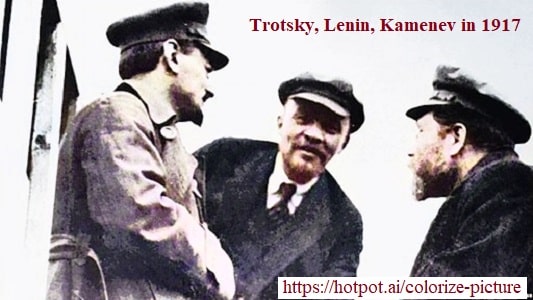
Even if the dictatorship of the proletariat were to arise within the formal structure of bourgeois democracy in some country or other, that fact would by no means avert the civil war. The question of who is to rule the country, i.e., the question of the life or death of the bourgeoisie, will be decided on either side not by references to certain paragraphs of the Constitution but by the use of all forms of violence. However deeply Kautsky...[delves into]... the cause of human cruelty, he will find no other historical method of breaking the class-will of the enemy than the systematic and energetic use of violence.
The degree of ferocity of the struggle depends on an array of domestic and international factors. The more ferocious and dangerous be the resistance of the overthrown class enemy, the more inevitably does its suppression entail a methodology of terror.
[...]
The type or degree of the repression is of course not a question of "principle" but of expediency. In a revolutionary period a deposed party which does not reconcile itself to the [new] ruling class and which shows its defiance by a desperate struggle cannot be terrorized with a threat of imprisonment, as it does not believe in its duration. It's just this simple but decisive fact that explains the widespread recourse to shooting in a civil war.
Or perhaps Kautsky wishes to say that execution is not expedient, that "classes cannot be cowed." This is untrue. Terror is futile when it's merely reaction against a historically-mandated ascending class. And then "in the long run" alone. But terror can be very efficient against a reactionary class that does not want to exit the scene of operations. Intimidation is a powerful weapon of policy, both internationally and domestically.
War like revolution is based on intimidation. A victorious war, generally speaking, destroys only an insignificant part of the conquered army, intimidating the remainder and breaking their will. Revolution works the same way: it kills individuals and intimidates thousands. In this sense the Red Terror is not distinguishable from an armed insurrection; indeed it represents the Red insurrection's direct continuation. State terror by a revolutionary class can be condemned "morally" only by a man who in principle rejects (in words) every form of violence whatever and thence every war and every uprising. To own this stance one must be merely and simply a hypocritical Quaker.
"But in that case, in what do your tactics differ from the tactics of Tsarism?" we are asked by the high priests of Liberalism and Kautskianism.
You do not understand this, holy men? We shall explain it to you. The terror of Tsarism was directed against the proletariat. The gendarmerie of Tsarism throttled the workers who were fighting for the Socialist order. Our Extraordinary Commissions shoot landlords, capitalists and generals who are striving to restore the capitalist order. Do you grasp the...difference? Yes? For us Communists it's quite sufficient.
(Leon Trotsky, 1920: "Terrorism". Leon Trotsky Internet Archive [www.marxists.org] 2008)
6. NEW BOLSHEVIK SLEIGHTS OF HAND.
At present Rykov was President of the Superior Council of the Economy and leader of the Council of Labour and of National Defence. Since Lenin's death he was also appointed vice president of the Council of People's Commissars in place of Kamenev. The designation of Rykov to substitute Lenin seems to indicate the Soviets' desire to resolve peacefully the split whose principal proponents to date are Trotsky, Sapronov, Preobrazhensky and Radek.
Perhaps Rykov's rapprochement with the Oppositionists—not doctrinal but sentimental—determined that he and not Kamenev or Stalin became the recently deceased dictator's stand in. Nonetheless Rykov's accession to Lenin's vacant chair will not appease the two factions disputing the ideological supremacy and the fruits of power in Bolshevik Russia.
Madrid (via telephone): Reports from Moscow state that Lenin's widow sent a letter to the working class asking it to protect the children.
Riga: Trotsky railed against MacDonald the British Prime Minister at the last plenary meeting of the Moscow Soviet,
We shall faithfully discharge the financial obligations we may agree to, but this does not hinder us from telling the British working class: you do not currently have a Government worthy of you. MacDonald said recently that they had waged war against the Third International, defeating it. The British Prime Minister seems to believe that we have been defeated because there still exists a bleeding and ruined Europe governed by Mensheviks or half-Mensheviks. You have fought and will fight against Moscow, but Red Moscow, erected by a great and powerful architect, will triumph over European Menshevism and British MacDonaldism. The man hasn't been born who can vanquish Moscow.
Nothing other than could have happened. A great repression is always followed by a great reaction. The Soviet regime, the great Red Terror in Russia, could not be an exception to the rule and it won't be, judging from the latest reports coming out of the old empire of the tsars.
Owing to the exceptional attributes of his character, his matchless energy, his perception, his sectarianism and his cruelty without precedent, Lenin was able to maintain Russia in a state which baffles how it could have lasted so long. Dead the great tyrant presently, the inheritance he bequeathed to his heirs appears to overwhelm the will and ability of the three minor tyrants. In this or that one abides the cruelty and sectarianism of the "teacher" but in none can someone discern Lenin's pernicious energy and talent. Upon his demise sprang up the dissent and divisions that threaten to topple the Soviet regime.
The Council of People's Commissars has been well-nigh replaced with a triumvirate of three nepharious personalities: Kamenev, Zinoviev and Stalin. The new tyrants appointed an ardent foe of Trotsky deputy People's Commissar for Military Affairs to annul the Commissar and become, as the deputy already has, the true kingpin of the Red Army.1
The first care which that friend of the triumvirate took was to relieve nearly all the generals appointed by Trotsky of command. Therefore Trotsky has become a mere figurehead who indulges in the innocent sport of delivering speeches against all Governments and all peoples who do not view Russia with good eyes.
Meanwhile the triumvirate proceeds without scruple to deport under futile pretexts all the outstanding figures of the Communist section that mounts opposition. That policy together with the mass executions by firing squad that the triumvirate carried out some days ago is kindling a muted protest in the Muscovite people that will produce the logical results before too long.
The current dictators lack financial resources because the country is completely ruined and because—negotiations with other Governments of Europe having foundered recently—they can harbour no hope of concluding certain loans they had banked on. Dictatorships are difficult to maintain without money, and this penury which the new triumvirate of Muscovite tyrants wallows in will eventually smother them.
The Government of the Republic of the Soviets, as Russian Communists conceive it, can only be run by a man like Lenin, as we have already said. Lenin has died and the regime will also die.
How will Lenin be replaced? The answer to the question is rather difficult. Withal if no man appears who enacts a policy of liberty and justice—such a policy could still save Russia—chaos will certainly break out and life, which is already impossible in the Muscovite cities and in the countryside, will turn into a veritable hell for the Russian people.
Today's tyrants will not be able to enjoy Lenin's inheritance, and the civilized world will behold before long the great catastrophe that will be a sort of epilogue to the tragic reality which the tsarist regime implanted in that part of Europe with its brutal blunders: the victory of the terrifying revolution, the worst consequence of the Great War.
😲 Why on earth was Trotsky so passive?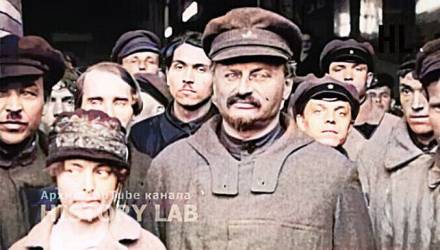
In September [1923] the troika [Kamenev, Zinoviev, Stalin] decided to deal the first serious blow to Trotsky. Since the beginning of the Civil War, Trotsky had been the organizer and permanent leader of the Red Army, holding the posts of People's Commissar for Military Affairs and Chairman of the Revolutionary Military Council of the Republic. The troika planned his removal from the Red Army in three stages. First, the Revolutionary Military Council was to be expanded and filled with Trotsky's opponents so that he would be in the minority always. In the second stage, the Ministry of War administration was to be restructured, Sklyansky removed and Frunze appointed in his stead. The final third stage entailed removing Trotsky from his post as People's Commissar for Military Affairs.
Russia's Commissar of the Economy has published a voluminous report of eight hundred pages entitled, "The National Economy of the Soviet Union for the Years 1922-1923."
A chapter on population prints the following statistics: (1) 4,053,000 deaths during the War and the Revolution. (2) 5,200,000 deaths during the famine of 1921-1922.
Now since Russia lost 2,500,000 men in the war [i.e., the First World War], the number of deaths in the Civil War was 1,553,000. Adding to this number the 5,200,000 deaths caused by famine yields a total of 6,753,000 human lives lost, sacrificed to the Soviet regime.
[...]
It's about what was once Russia, about the Republic of the Soviets.
In this new Eden thousands of abandoned fugitive or orphaned children fill the streets of Moscow. These unfortunate kids are herded in "flocks" by the authorities who exercise their mission with so "fatherly" a concern that many of the children are found to be cocaine addicts.
How do they obtain the drug?
Probably the children are couriers for cocaine dealers, and in the moral milieu they inhabit, they probably purloin for their individual pleasure some fraction of the merchandise entrusted to their "innocent" hands.1
Such cute children! But it's not their fault.
Moscow: The Ministry of Foreign Affairs has refuted categorically the rumours that circulated yesterday about an alleged sedition in Kronstadt and about the arrest of Mr. Trotsky the People's Commissar of War and the Navy.
Zinoviev's famous letter will play an important role in the story of our days. The secret instructions sent by the president of the Third International to British Communists disclosed all at once the serious nature of the Bolshevik threat to the British electorate, a circumstance that contributed much to the Tories' unexpected victory—and we know that the reestablishment of a conservative regime in Great Britain will lend a new aspect to international politics. The English Government rescinds the Treaty which Mac Donald had signed with the Soviets, denies them a loan and warns the Moscow Government about the consequences that perseverance in their Bolshevik propagandizing might bring forth. Austen Chamberlain is not disposed to accept a real difference between the Moscow Government and the Third International. Rather he makes the former responsible for the stratagems of the latter. Chamberlain's three diplomatic notes deal the Soviets a much-deserved lesson, and the world at large has read them with genuine satisfaction, as if relieved of a nightmare.
The severe British diplomatic notes have come at the right time, precisely when Bolshevik propagandizing intensifies. Our readers will surely be acquainted with the sanguine intentions of Estonian Communists which fortunately foundered on the loyalty of the troops; among the numerous victims of the uprising must the death of the Minister of Communications be lamented. A victory of the attempted coup in Estonia would have had for sequel a Communist uprising in neighbouring Latvia, a country that also suffers a profound economic crisis, and then perhaps sequels in Finland and in Poland.
In effect the hostility that exists between Leon Trotsky and the triumvirate of the Central Executive Committee (Zinoviev, Kamenev, Stalin) does not throttle the intensity of Bolshevik propaganda abroad.
In Poland the Communists exploit, above all, the discontent of the national and religious minorities; unfortunately the errors committed by the Polish rulers ease the job of Communist agitators.
The same can be said about Romania in whose new province, Bessarabia, roils a major Bolshevik movement. Approximately a month ago the Soviets of the Ukraine created a small "Autonomous Republic of Moldavia" on the eastern border of Bessarabia. That republic will exert a force of attraction on the workers and peasants of the province conquered by the Romanians. The Bolsheviks in claiming possesion of Bessarabia are following on the footsteps of Tsarist diplomacy and will garner the backing of all Russian nationalists. Bessarabia is not only a rich province, it sits on the way that leads to Constantinople. By retaking Bessarabia the Russians would find themselves on the left bank of the Lower Danube once more and only the Dobruja Territory would separate them from Bulgaria whose frontiers graze Adrianapolis.
Withal the lords of Moscow figure that Bulgaria will be the epicenter of their propaganda machine, the Archimedes fulcrum from where agitate the Balkans and inflame Europe. The existence of a Bolshevik office in Vienna distributing pamphlets and money to the Communists of the Balkan countries has been demonstrated. It seems that Stephan Radic the leader of the Croatian Peoples' Peasant Party has a link to said office just as the leaders of the Macedonian guerrillas ("komitadyis") did who assassinated Todor Aleksandrov for having opposed Bolshevik propaganda in Macedonia and in Bulgaria.
The Bolsheviks, under strict surveillance in England, will try to retaliate in France, which has renewed normal diplomatic relations with Russia. As soon as Leonid Krassin the engineer and Soviet ambassador settles down in Paris, the inviolability of the diplomatic valise will enable the Bolsheviks to introduce subversive propaganda in France. We can foresee that his presence and that of his countless collaborators in Paris will bring about the intensification of Bolshevik propaganda in Spain as well.
A DIPLOMAT
Paris: London newspapers publish news from Riga that state the following:
"Strife has broken out between Trotsky and Stalin supporters with grave clashes in Moscow and Petrograd.
"All squares and streets around the Kremlin are full of soldiers, field guns, armoured personnel carriers and machine guns.
"Battles were also registered in Nizhny Novgorod and Kazan.
"Trotsky's supporters have taken over the Soviet administrative centers of less important cities.
"Trotsky has the backing of a large section of the Red Army while Stalin controls the Tcheka and the Police.
"Trotsky's supporters managed to capture Stalin, but his forces were able to rescue him after a bloody combat.
"It needs be said that all these news reports from Riga are very confusing and omit details.
"Rumour had it that Trotsky went to Crimea on the recommendation of doctors appointed by the Soviet Government; but these reports from Riga seem to say that Trotsky is still in Moscow or in Petrograd."
| And Now For Something Completely Different |